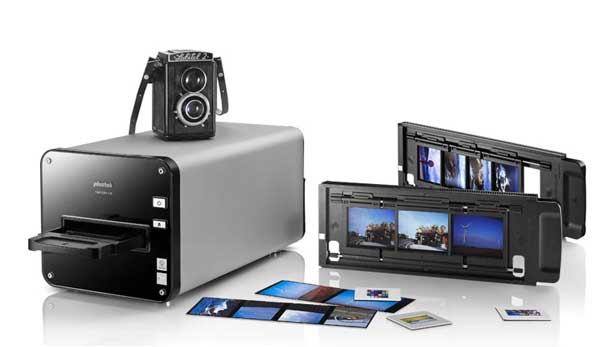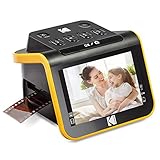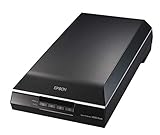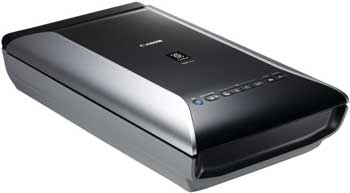Best 120mm Film Scanner Reviews: Top 9 Picks for 2023
“Yesterday’s shoot was very fun, right?”
“Yes! Can you please email me the original scanned files of the photos you took? I need the high-res versions for a special project.”
And this is precisely where your dilemma starts. The importance of a good quality film scanner needs no mentioning. It is a must for any photographer who needs to have usable digital versions of still photos for printing, archiving, sharing, and various projects.
Without the best 120mm film scanner by your side, you won’t be able to use the beautiful photos you’ve taken. Not sure how to start looking?
We got you! In this article, you will find reviews of our top 9 picks, complemented with a buying guide on how to choose a scanner for 120 film.buying guide on how to choose a scanner for 120 film.
Image | Name | Editor's Rating | Price |
|---|---|---|---|
KODAK Slide N SCAN Film and Slide Scanner | 5 out of 5 | ||
Epson Perfection V600 Color Photo | 5 out of 5 | ||
Wolverine F2D Saturn Digital Film & Slide Scanner | 5 out of 5 | ||
Epson Perfection V850 Pro Scanner | 4.5 out of 5 | ||
Canon CanoScan 9000F MKII Flatbed Photo | 5 out of 5 |
Table of Contents
Top 9 Recommended Best 120mm Film Scanner
We have scoured the market for the best of the best, and here they are. Many of the products are not exclusively 120 film negative scanner, so you will get versatile use.
1. KODAK Slide N SCAN Film and Slide Scanner

We are kicking off our review section with the well-renowned, well-loved brand for all things related to photography, Kodak. This affordable scanner from them can easily be called the best 120mm film scanner. Keep reading to know why!
First off, the scanner comes with a large LCD display that shows crystal clear pictures as the device is scanning. This way, you can preview the photo you will be getting while scanning. To me, that is a very cool & uncommon feature. I really enjoyed it.
What’s more, you can edit your photos with a few touches! If the photo being shown looks dull, you can quickly edit it on the device following a few simple steps.
This saves a lot of time, as I do not need to use a separate editing app on another device to touch up my photos.
It also gets brownie points for being very user friendly. Setting up is very easy & intuitive. You do not need to spend hours learning how to use this device.
Sure, the manual will be needed here and there for reference, but it is also easy to figure out on your own.
Check out the rest of the cool features in the highlighted list below. Considering that you will get all of that at a very affordable price rate, this scanner definitely belongs on the list of top medium format film scanners.
Highlighted Features:
2. Epson Perfection V600 Color Photo, Image, Film, Negative Scanner

Epson is another renowned brand that needs no introduction. This product from them is an exceptional scanner that provides a lot of fantastic features at a very affordable price point.
Many budget scanners often fail to create digital images that are high-res and sharp. This is why I was very pleasantly surprised to find that this product does that.
It has a 6400 x 9600 DPI hardware, which enlarges films digitally. The results? You will get amazing quality digital renditions of the photos you take.
Furthermore, the scans will be bright & crisp, thanks to its 48-bit depth. This scanner is a comprehensive one. It can scan slides and medium format panoramic films.
Moreover, it can even scan 120 negatives. These versatile operations make it useful in many applications, which is a big plus.
The digital ICE for prints & films is another spectacular feature. Thanks to this, you can scan damaged photos; and it will automatically detect and remove the appearance of any crease or damage. From films & negatives, any marks of dusts or scratches will be removed too.
So, you will not have to spend extra cash to get your photos retouched.
Highlighted Features:
3. Wolverine F2D Saturn Digital Film & Slide Scanner

Wolverine is not as renowned as the previous two brands. Nonetheless, they are known for making good quality entry-level scanners. So, if you are a novice photograph enthusiast who is dipping his/her feet into the water, this would be a great fit for you.
As you can already guess, this is another great budget option. If you would rather splurge on a product, stay tuned! For now, let’s get to the details of this spectacular model from Wolverine.
The first remarkable feature of this unit is how fast it is. Wolverine has added adapters & inserts meant to quickly load and scan images. This is why it takes only 3 seconds for this scanner to scan & convert one negative film or slide into a digital photo. That is a seriously impressive rate of scanning!
With this at your disposal, you will be scanning an entire photoshoot within just a few minutes.
This scanner has been specifically made for 120 films. So, if that is the kind of film you mostly work with, this is the one for you. It will scan your medium 120 negatives in a variety of sizes, including 2.5” x 1.75”, 2.5” x 2.5”, 2.5” x 3”, 2.5” x 3.5”.
In addition to that, you can also use this to convert 127 negatives & 35mm slides.
Highlighted Features:
4. Epson Perfection V850 Pro 120 Medium Format Film Scanner

If you are a professional who does not need a budget scanner and would love to splurge on a quality item, this might just be what you have been looking for. The Perfection V850 from Epson does not come cheap, but it will prove to be worth every penny.
The most eye-catching feature of this scanner is the pro-quality high resolution it provides to the photos it scans. You will be getting state-of-the-art resolution with the dual lenses of 4800 x 9600 DPI & 6400 x 9600 DPI.
Also, the scanner will automatically decide which lens to use based on the type of media you are scanning & the resolution you have selected.
Also, the LaserSoft Imaging SilverFast SE Plus software is a work of art. In the budget scanners, you can edit photos, but you do not get much flexibility when doing so.
With this software, you can touch up your scans exactly the way you like it from the plethora of different adjustment options.
Furthermore, it also fixes photos with backlight correction & dust removal. Scanning is faster than ever, thanks to batch system trays you can use for scanning. All in all, this is surely the best 120 film scanner, hands down.
Highlighted Features:
5. Canon CanoScan 9000F MKII Flatbed Photo, Film and Negative Scanner
Canon dominates the world of cameras, but are their scanners just as good in quality? The answer to that is yes.
Canon’s brand reputation is protected by this very impressive film scanner. If you have been looking for a great scanner for 120 negatives, this might be the one.
Often times, especially with involved & comprehensive software, editing & organizing all the scanned photos can get tricky & confusing, specially if you are not experienced in these sorts of things. If that is the case with you, then you will fall in love with Canon’s My Image Garden software.
It is very simple & easy to use. It will handle & organize all the photos you scan in an easy-to-use system.
Additionally, the photos you will be scanning with this item will all look great, thanks to Canon’s FARE (Film Automatic Retouching and Enhancement) retouch software.
This software will automatically correct & enhance your photos, removing any dust & scratches present on old films. It will also restore any faded or lost color. How cool is that?
You do not need to adjust the settings every time you scan a new type of film or negative, as the scanner is capable of automatically detecting what you are scanning & choosing the settings accordingly.
Highlighted Features:
6. Canon 2168B002 CanoScan 8800F Color Image Scanner

Up next, we have another great Canon film scanner to share with you. It is a multipurpose device that can scan not only films but also documents & photos. This is a famous scanner for 120 films.
Much like the previous Canon product, this one also tops the charts when it comes to easy interface & software. This is one of the easiest scanners to use. You will face no hurdles at all when operating it.
Just like usage, setting this unit up was a breeze too. In fact, it is so easy that you might wonder if something is wrong with it. You just have to install the software before it’s ready to use, which is another straightforward task.
The build of this device is very sleek and compact compared to average flatbed scanners. The resolution you will get from this device will also be good, at 4800 DPI. As for the previously mentioned FARE tech, it is available in this device as well.
FARE technology removes scratch & dust marks using an infrared process. Level 2 & 3 of this tech automatically corrects several issues, such as fade correction, tint restoration, grain correction, etc. The level 3 also does backlight correction, which lightens subjects that are dark in front of a bright backdrop.
Highlighted Features:
7. Plustek OpticFilm 120 Pro 35mm Film Strips, Slide and 120/220 Film Scanner
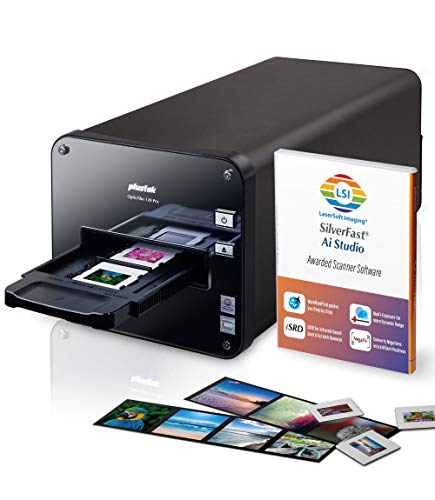
Plustek is a name that is bound to pop up whenever you talk about film scanners. Unlike the other brands in this list, Plustek specializes in making this particular type of scanners.
So, you know that they mean business. Because of their specialization, they produce products that will not disappoint you.
This scanner is meant for beginners and professionals alike. It boasts a hefty & solid hardware, which is a sign of professional quality.
People who are not new to scanning know how important it is to keep the film flat. Thanks to this device’s well thought-out and designed negative carriers, the films stay totally flat.
You will find carriers for 35mm and every kind of 120/220 film (6” x 4.5”, 6” x 6”, 6” x 7”, 6” x 8”, 6” x 9”, 6” x 12”).
It is very important to not get dust in your scanners, because that might greatly harm the image quality.
Luckily, this scanner that spectacular dust control. Both the rear & front openings of the negative carriers remain sealed with a plastic door when no carrier is inserted.
One drawback is the amount of noise this device makes. It is very loud, in a non-pleasant way. So, if you prefer working in silence, look elsewhere. Other than that, this is a seriously capable scanner for 120 films.
Highlighted Features:
8. Epson Perfection V800 Photo Scanner

Up next, we have another Epson creation. The V800 is very similar to the V850, so you can expect the same amazing quality & features.
This is a flatbed scanner but it functions well as a film scanner too. The unit can handle both positive and negative films as well as slides. You can scan various sizes of films in it, starting from 35mm to medium ones like 6 x 20cm to large ones like 8 x 10cm.
If you are a serious photographer with rigorous expectations, this scanner would be able to meet your demands. It has 6400 PPI (pixel per inch) optical resolution.
Thanks to that, it can detect and showcase even the smallest changes in shade. This, along with the dual-lens system, means photos will have impeccable details.
Just like the V850, this too has the LaserSoft Imaging SilverFast SE software and ICE technologies. Along with that, the Easy Photo Fix feature restores faded dull photos to their original glory with just one click.
Highlighted Features:
9. Epson Perfection V550 Color Photo, Image, Film, Negative & Document Scanner

We are ending our reviews with another Epson product, the Perfection V550. If you are looking for the great Epson quality on a budget, this right here is your match.
This is a 120 film negative scanner, which can also scan other documents that are not films. This makes this beast a multifunction device, something that will be worth the money.
Epson scanners have their own following. If you would like to be a part of that, but cannot afford the price tag, then you’d be delighted to know that you get many of the great Epson features at an affordable rate in this one.
By now, you already are aware of Epson’s Digital ICE & Easy Photo Fix features. They are present in this fantastic device, too.
If you are considering this device, then chances are that you would also enjoy saving cost. You are in luck!
This device has ReadyScan LED technology, which, coupled with the no warm-up time, saves energy. So, you will be helping the planet, while also saving additional costs. It’s a win-win!
One unique & special feature of this device is the ABBYY FineReader Sprint Plus OCR. With this, you can convert scanned documents into texts that you can edit.
Highlighted Features:
Scanner for 120 Film Comparison Chart
Product Name | Resolution | Connection Type | Photo Preview | Dimension (inches) |
|---|---|---|---|---|
KODAK Slide N SCAN | 14 / 22 MP | HDMI | Yes | 5.27 x 5.35 x 3.74 |
Epson Perfection V600 | 6400 x 9600 DPI | USB | No | 19 x 11 x 4.6 |
Wolverine F2D | 20 MP | HDMI | Yes | 7.1 x 4.7 x 7.6 |
Epson Perfection V850 | 6400 x 9600 DPI | USB | No | 12.1 x 19.8 x 6 |
Canon CanoScan 9000F | 9600 x 9600 DPI | USB | No | 10.7 x 18.9 x 4.4 |
Canon 2168B002 | 4800 x 9600 DPI | USB | No | 18.9 x 10.8 x 4 |
Plustek OpticFilm 120 Pro | 5300 DPI, 273 MP | USB | No | 8.27 x 14.57 x 7.48 |
Epson Perfection V800 Photo Scanner | 6400 x 9600 DPI | USB | No | 12.1 x 19.8 x 6 |
Epson Perfection V550 | 6400 DPI | USB | No | 19.1 x 11.2 x 4.6 |
120mm Film Scanner Buying Guide
The best scanner for 120 film can really rev up your workstation, allowing you to multitask and acquire the best quality scans of your documents and hard copies of your pictures.
But with the market saturated with similar products, you might get overwhelmed with all the choices. Hence, it might seem difficult to figure out the perfect 120 film scanner at first.
Fear not, we’re here to rid you of that worry. Read our buying guide to understand the features you should factor in. Then, prioritize them according to your needs and find out the scanner that’s perfect for you!
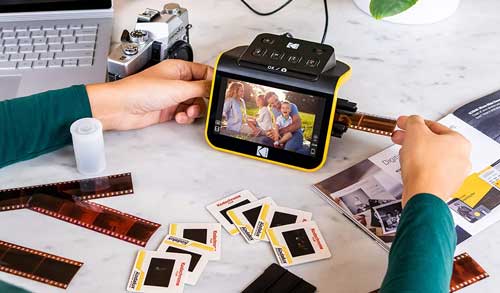
Color
Color is perhaps the most crucial and tangible aspect of the lot. After all, the first thing we expect from a scan is excellent color quality.
Even if your priority is black and white scanning, color still holds paramount importance, as the depth of the grayscale really improves the quality of the entire scan.
The unit used to measure the color and depth of the scans are called bits. You should look into the attribute section of the scanner for this information.
Modern scanners are equipped with the most sophisticated components, allowing them to reach ceiling-shattering levels of depth. Some models are known to hit 48 bits even, a staggering number ensuring the best scan quality.
However, buying a device with 48 bits of depth might overwhelm your budget, as these devices do not come cheap. Hence, you may have to compromise. In that case, we would suggest that you don’t go below 24 bits.
Resolution
With digitization, the importance of resolution has amplified thousandfold. You would want your scanner to convert the images into exact replica of themselves, hence good resolution is a must.
Without this attribute, it is unlikely that your scans will come out decent. Rather, they may look pixelated and nothing like the original hard copy. The gamma correction and contrast of the image shall be thrown in the bin as well.
Depending on your budget, you can go as far up as 4800 pixels of resolution. However, there is a downside to high resolution scanners. Firstly, they tend to be expensive. Secondly, the scanned softcopies often take up more space.
Considering this, you can opt for lower resolution scanners, but don’t go lower than 600 DPI. This range is good enough for any professional or casual work. However, you can always save your high-resolution scans at a lower DPI providing versatility to your storing of images.
Dmax
This one and the next are more technical terms. Dmax indicates to how well a scanner captures dark portions of the image. Presumably, this attribute comes in handy when scanning high contrast films.
That being said, if your priority is to scan high contrasted films, then get a scanner with high Dmax, as they tend to be more capable of capturing the differences in color.
Dmin
Dmin is another similar attribute which, to put into the simplest words, indicates the level of highlights the scanner can detect and output. There’s a catch, though. The lower the Dmin value, the better the scans can identify the highlights.
Format
This is the most obvious feature you should look out for when searching for the best 120 film scanner. Yet, with our eyes peeled on other attributes, it’s easy to get distracted. Considering this, we’re telling you again to align the product you’re seeking with the format you need.
If you’re looking for 120mm film formats, then definitely go for scanners of respective quality.
Digital Display
Normally, scanned images are displayed in the computer. But what if we told you that you won’t even need that? This is where the digital display scanners come in.
The scanners with digital display don’t require computer connection, rather they provide the user with a preview screen that can give you indicators regarding the quality of the scan. You can even use TVs to display your scanned images, although the resolution of the hardcopy matters here.
Adapters
This attribute is vital for the versatility of the scanner. After all, who wouldn’t love it if their device were capable of scanning different sizes of slides and films?
This feature is mostly seen in dedicated negative conversion scanners. However, buying a regular scanner is preferable if your priority is higher resolution scans.
Size
Another consideration for your workstation, size matters if you’re working with limited space. Normally, a huge scanner is discouraged since it not only takes up a large chunk of work area but also makes the user sacrifice portability.
Anyone would prefer their device to be portable, hence it’s our advice to go for a scanner that is compact in size.
Frequently Asked Questions
What should I check before I scan a 120 film?
Firstly, you have to ensure that the scanner you have supports this format of film. If it does, then check if you have the software installed to make scans.
Also, check if the default software is good enough to give you the best quality 120 film image. If not, install a third-party one.
Remember, cheap scanners may not come with the best quality software.
How do I choose the resolution?
This depends on your intention of scanning the photos. If you need to archive them, then 600 DPI should be enough, saving you space. But, if you want to share your photos online, or use them for projects, then use 200 DPI JPGs.
Lastly, if you need to show your photos on TV or other large screens, a high-resolution scan is a must.
What is a medium format film? Is it the same as 120 film?
A medium format film is, as the name suggests, a medium-sized roll film format. It is larger than 35mm film and smaller than a sheet film. Yes, it is also known to people as 120 films.
Can you scan analog negatives in a scanner?
If your scanner permits them, then yes. Regular scanners, for example, usually are not suitable for digitizing analog pictures.
They cannot create the needed tone, depth, or vividness. But film scanners are specialized with high DPI and Dmax. You can get high-quality digital images from them.
What is the ideal color depth for scanners?
The higher the number, the better. For regular use, the 24-bit color depth is enough.
Final Words
We have reached the end of this article. It’s time to bid adieu. Hopefully, by now, you have a fairly clear idea about film scanners & how to choose one.
If you are still unsure, locate your needs from a film scanner from the buying guide, then read the highlighted features from our 120 film scanner reviews to pick one.
With the best 120mm film scanner by your side, you will be producing amazing quality digital photos in no time.
That’s all for this article. Thanks for stopping by!

